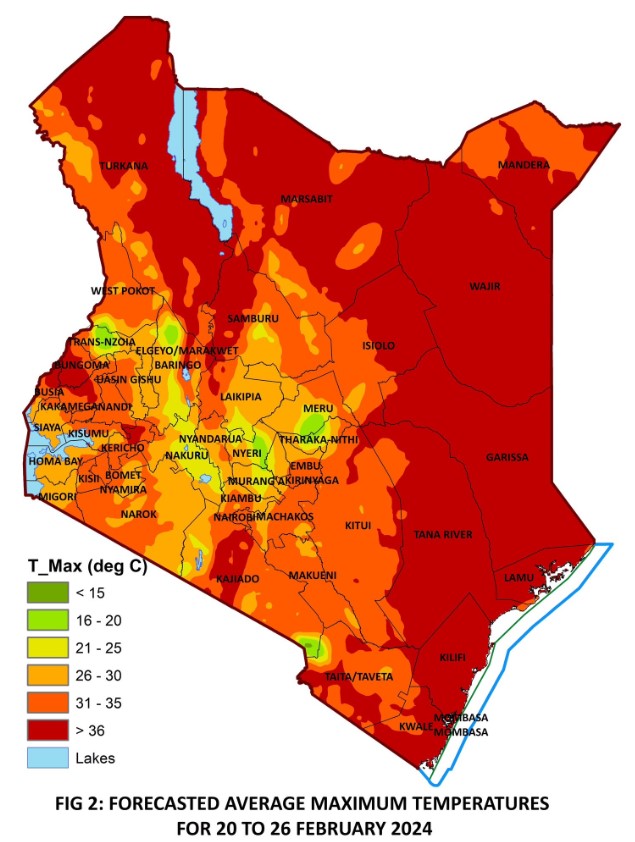High temperatures to continue this week, weatherman warns

Average temperatures will continue ranging over 30 degrees across most counties this week.
Kenyans will have to devise ways to cope with the ongoing heat after the Meteorological Department confirmed that average temperatures will continue ranging over 30 degrees this week.
Kenyans have been complaining over "excess heat" in the last few weeks terming them abnormal, allegations that the Met Department has downplayed saying the ongoing high temperatures are normal and serve as a precursor to the April long rains.
More To Read
- Prepare for hot days, rains, and strong winds this week- Meteorological Department
- Brace for heavy rains, strong winds in coming days - Kenya Met
- Heavy rains and low temperatures expected in several counties – Met Department
- Meteorological Department forecasts chilly, wet conditions over next five days
- Rain, thunderstorms expected across 20 counties in latest forecast
- Kenyans warned to brace for hot days, cold nights this week
"This week, high average daytime temperatures of over 30 degrees centigrade are expected in various counties of Nairobi, Kiambu, Embu, Busia, Turkana, Samburu, Marsabit, Mandera, Wajir, Isiolo, Garissa, Tana River, Lamu, Kilifi, Mombasa, Kwale, Taita Taveta, Kajiado, Makueni, Kitui, Machakos, Laikipia, Baringo. Others include Elgeyo Marakwet, West Pokot, Bungoma, Kakamega, Kisumu and Narok," the Met Department said.
Some firms have, however, sent cautionary statements to their employees urging them to be cautious of the heat to avoid suffering from heat stroke.
Heat stroke occurs when the body temperature can no longer control its temperature.
Advisory
To avoid suffering the dire effects of the sun, Kenyans have been advised to wear light clothing to work, stay hydrated, as much as possible stay under some form of shade, wear a hat, apply sunscreen and avoid over-exerting themselves.
 Forecasted average maximum temperatures between February 20-26, 2024. (Photo: Kenya Meteorological Department)
Forecasted average maximum temperatures between February 20-26, 2024. (Photo: Kenya Meteorological Department)
Most of the complaints Kenyans have mentioned on social media include; excessive sweating, dehydration and headaches.
Interestingly, some areas in Kenya are experiencing heavy rainfall including Uasin Gishu, Nandi, Kisii and Bungoma counties.
Last week, the World Meteorological Organisation (WMO) said January marked the eighth month in a row that temperatures were the hottest on record, further fueling the urgency for climate change mitigation measures.
"The record-breaking trend seen for much of 2023 has continued in 2024, with January being the hottest January on record. It is the eighth month in a row that is the warmest on record for the respective time of the year. Sea surface temperatures have been record high for ten consecutive months," WTO said quoting data sets from NASA, the US National Oceanic and Atmospheric Administration (NOAA), the European Union's Copernicus Climate Change Service and Japan Meteorological Agency.
NOAA added that January was a month of climate extremes; from record-breaking global temperatures to significant sea ice shifts, our planet continues to showcase dramatic signs of climate change.
WMO further confirmed that 2023 was by far the warmest year on record due to human-induced climate change and a warming El Niño.
Top Stories Today












































